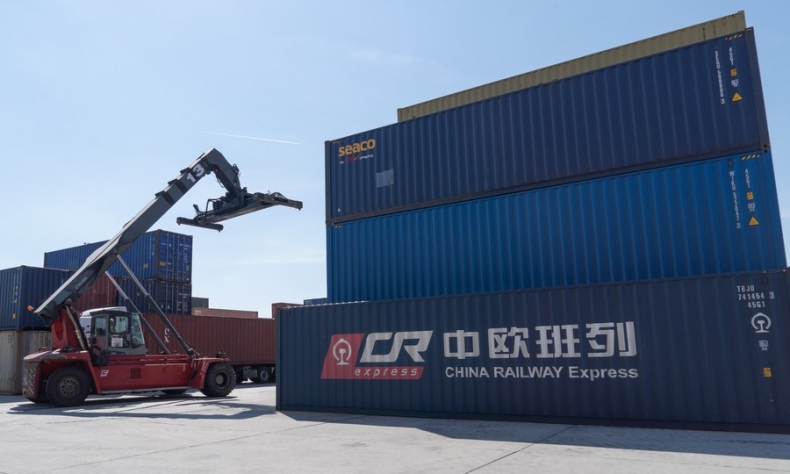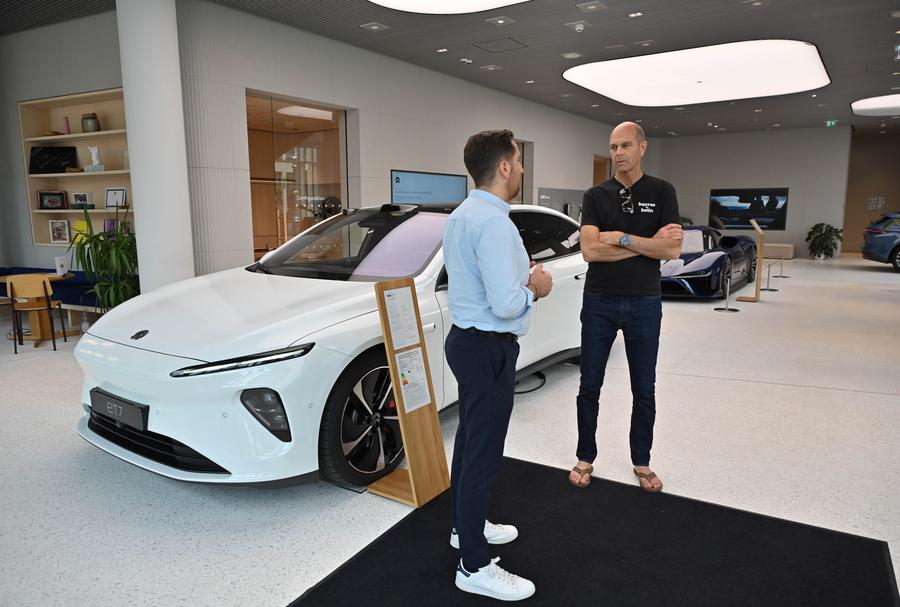China-EU Partnership: Mutual Uplift for a Brighter World – Celebrating the 50th Anniversary of Diplomatic Ties

A sound and stable partnership between China and the EU will not only propel shared development, but also illuminate a path for the world.
This year marks the 50th anniversary of the establishment of diplomatic relations between China and the European Union (EU), a pivotal milestone that bridges the past and future of China-EU relations. Over the past five decades, China-EU ties have withstood the test of shifting global dynamics, and maintained stable development momentum that has not only brought mutual benefits to our peoples, but also contributed to world peace, stability, development, and prosperity.
Amidst today’s turbulent international landscape, China-EU relations carry heightened strategic significance and global implications. A sound and stable partnership between China and the EU will not only propel shared development, but also illuminate a path for the world.
The past half-century has witnessed the continuous elevation of China-EU relations. In 1975, visionary leaders from both sides, assessing the global situation with extraordinary political courage, broke through Cold War barriers and established diplomatic ties between the two sides. A new chapter opened in 2001 with the establishment of the China-EU comprehensive partnership, which was upgraded to a comprehensive strategic partnership in 2003. The relationship reached another milestone in 2014 when President Xi Jinping made his historic first visit to EU headquarters. During the visit, President Xi proposed to build four bridges for peace, growth, reform and progress of civilization to forge a China-EU comprehensive strategic partnership with greater global influence.
Strategic coordination between the two sides has intensified. In early 2025, President Xi held a phone conversation with European Council President António Costa. During his European tour last year, President Xi had a trilateral meeting with French President Emmanuel Macron and European Commission President Ursula von der Leyen. These high-level exchanges yielded crucial consensus on charting the course for China-EU relations and provided strategic guidance for future development.
Since its inception in 1998, the China-EU Summit mechanism has convened 24 meetings. The two sides have established five high-level dialogues discussing issues covering strategy, economy and trade, digital development, environment and climate, as well as people-to-people exchanges. There are also over 70 specialized dialogue mechanisms. These multi-tiered dialogue mechanisms have proven instrumental in advancing practical cooperation across all domains.
The past half-century has witnessed vigorous growth of China-EU pragmatic cooperation. As each other’s major trading partner and investment destination, China and the EU have seen their trade volume surge from US $2.4 billion at the time when the two sides first established diplomatic ties to US $785.8 billion in 2024, while two-way investment in stock has risen from nearly zero to approximately US $260 billion. The China-Europe Railway Express, operating over 100,000 freight train trips connecting 227 cities across 25 European countries, has become an artery connecting Asia and Europe.

Practical cooperation continues deepening China-EU ties across sectors. The implementation of the China-EU Geographical Indications Agreement has seen the second batch of products, 175 products respectively from each side protected by the program, bringing more premium goods to both markets and to ordinary people’s dinner tables. Fruitful collaboration extends to finance and taxation, customs, transportation, water resources, press and publishing, healthcare, and judicial affairs. Steady progress has been made in emerging fields, like the digital economy, new energy, and artificial intelligence.
People-to-people bonds grow ever stronger. Joint initiatives, such as the China-EU Culture Year and Tourism Year events, have flourished. China has launched unilateral visa-free policy covering 24 EU member states. From giant pandas and the Chinese animated blockbuster Ne Zha to the video game sensation Black Myth: Wukong, Chinese culture is increasingly captivating European audiences, forging heart-to-heart connections between people on both sides.
The past five-decade journey has witnessed China and Europe’s shared contribution to global peace and development. China and Europe are two major forces in building a multipolar world, two big markets that promote globalization, and two great civilizations that advocate cultural diversity. China and Europe have forged a partnership to shoulder global responsibility. Both sides champion multilateralism, coordinating closely at the UN, G20, and other international platforms, while maintaining constructive dialogues on hotspot issues, including the Ukraine crisis, Palestinian-Israeli conflict, and Iran nuclear issue.
Both China and the EU support free trade, advocate for the maintenance of the multilateral trading system centered on the World Trade Organization, and are committed to promoting WTO reforms. Both hold a global vision, work together to promote the adoption and implementation of the Paris Agreement, maintain communication and coordination on major issues related to the future of humanity, such as climate change and artificial intelligence, and enhance the well-being of all humankind.
The history of the China-EU relationship shows the partnership has not always been smooth sailing. The key to maintaining the relationship lies in respecting each other’s social system and development path chosen by their respective peoples, as well as to respect each other’s core interests and major concerns. Using history as a mirror enables us to better navigate the future.
The 50-year development of China-EU relations enables people to reach four conclusions.
First, mutual respect is the most precious experience for developing diplomatic relations. China’s traditional idea of “harmony in diversity” coincides with the EU’s motto of “united in diversity.” Differences in social systems, ideologies, historical traditions, cultures, and developmental levels between China and the EU should serve as a driving force for communication and cooperation, rather than excuses or reasons for confrontation. The 50-year development history of China-EU relations demonstrates that as long as both sides respect each other, treat each other as equals, and engage in honest dialogue, cooperation can be promoted and tasks can be finished.

Second, mutually beneficial and win-win cooperation is the most powerful impetus of China-EU relations. China’s reform and opening-up has been advancing in tandem with European integration. After 50 years of continuous cooperation, the two sides have been closely intertwined economically. Starting from scratch, pragmatic cooperation between the two sides has expanded from industrial manufacturing to emerging technologies, and from traditional trade to joint manufacturing. The two sides complement each other in terms of edges in economic development and their economic cooperation is mutually beneficial. Carrying on such win-win cooperation, resolving economic and trade differences and frictions through dialogue and consultation, and opposing the politicization of economic and trade issues, the two sides will embrace an even brighter future in their relations.
Third, multilateralism is the greatest consensus benefiting long-term relations between the two sides. China and Europe are creators and beneficiaries of the postwar international order, as well as champions for economic globalization and a multi-polar world. China has always taken Europe as an important pole in a multi-polar world and supported European integration and the EU’s strategic autonomy. From stepping out of the shadow of the Cold War to upholding the UN’s authority in international affairs, from addressing climate change to combating the COVID-19 pandemic, China and the EU have consistently chosen multilateralism and played a leading role in global governance regardless of how the international situation changes. The two sides have been working to move the international order toward a more just and reasonable direction, continuously contributing to world peace and development.
Fourth, cooperation partnership is the most accurate positioning. Located at the two ends of the Eurasian continent, China and Europe have neither conflicting fundamental interests nor geopolitical contradictions. Their consensus far exceeds their differences, and cooperation surpasses competition. They are mutually beneficial partners rather than rivals in a zero-sum game, and certainly not enemies. The historical development of China-EU relations indicates that as long as they maintain their partnership, solutions to problems can always be found. As the international situation becomes increasingly severe and complex, China and the EU must adhere to their original intention in developing diplomatic relations, strengthen strategic communication, enhance strategic mutual trust, and uphold the positioning of partnership.
Currently, the world is undergoing unprecedented changes unseen in a century. In light of a complicating global landscape, both China and the EU should make correct choices and go with the historical trends based on their fundamental interests and for the future of the world. China has confidence in the EU and sincerely hopes that the EU can also become a trustworthy partner for China. The Chinese side sincerely hopes that joint efforts can be made to promote steady and long-term development of the China-EU comprehensive strategic partnership.

For this purpose, efforts can be made in the following aspects.
China and the EU should act as pioneers for dialogue and cooperation. The two sides should take the 50th anniversary of bilateral diplomatic relations as an opportunity to further strengthen high-level exchanges, deepen cooperation in various fields, ensure the success of the celebration events marking the 50th anniversary, enhance mutual trust, dispel suspicions and improve understanding toward each other through constructive communication. It is of great significance for the two sides to seize opportunities and address challenges.
China and the EU should work together to advocate openness and development. Opening up is a defining feature of Chinese modernization. China will make unremitting efforts to expand higher-level opening up, and stay committed to sharing development opportunities with all countries. Embracing China is embracing opportunities, and investing in China is investing in the future. As the beneficiary of an open world economy, we have no reason to let de-risking deprive us from opportunities and cooperation. Rather, they should remain open to each other, maintain the stability of industrial and supply chains, and further tap cooperation potential in green energy, the digital economy, science and technology, finance and other fields. China welcomes the EU to board the express train of China’s economic growth, and work with China to achieve common development and prosperity.
China and the EU should work together to practice multilateralism. This year marks the 80th anniversary of the victory of the World Anti-Fascist War and the founding of the United Nations. China and the EU need to practice true multilateralism, improve global governance based on extensive consultation, joint contribution and shared benefit, and promote political settlement of hotspot issues within the UN-centered multilateral framework. The two sides should work jointly to address the challenges for all of humanity, such as climate change, AI, and other issues, and safeguard world peace and international justice. In the face of the global development gap, China and the EU should promote greater synergy between the Belt and Road Initiative and the EU’s Global Gateway strategy, so as to make progress in realizing the UN’s sustainable development goals.
China and the EU should work together to facilitate mutual learning between civilizations. Chinese President Xi Jinping proposed the Global Civilization Initiative that calls on all parties to let cultural exchanges transcend estrangement, mutual learning transcend clashes, and coexistence transcend feelings of superiority. China is ready to work with the EU to conduct exchanges and dialogue with an open and inclusive attitude, and advance common development through mutual learning. China will include more countries in its visa free policy, and implement the initiative of increasing the number of French students studying in China to more than 10,000, and doubling the number of young Europeans attending exchange programs in China in three years. At the same time, China hopes to work with the EU and develop toward the same direction by further facilitating personnel exchanges between the two sides. China is willing to join hands with Europe to cement public support and strengthen the bond of friendship between the peoples to inject continuous impetus to China-EU relations.
As an ancient Chinese poem goes, “With high tide and tailwind, it is time to sail a smooth ride.” At this new starting point, the two sides have the capacity and wisdom to jointly usher in a brighter future and another promising 50 years for China-EU relations.
Cai Run is Chinese ambassador to the European Union.
 Facebook
Facebook
 Twitter
Twitter
 Linkedin
Linkedin
 Google +
Google +










